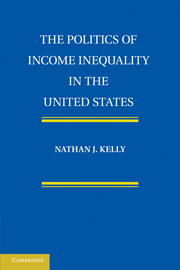Book contents
- Frontmatter
- Contents
- List of Figures
- List of Tables
- Acknowledgments
- 1 Explaining Income Inequality
- 2 The Distributional Force of Government
- 3 Political Conflict over “Who Gets What?”
- 4 Party Dynamics and Income Inequality
- 5 Macro Policy and Distributional Processes
- 6 Putting the Pieces Together: Who Gets What and How
- 7 Distribution, Redistribution, and the Future of American Politics
- Appendix A Congressional Questionnaire
- Appendix B Measuring Income Inequality over Time
- Bibliography
- Index
7 - Distribution, Redistribution, and the Future of American Politics
Published online by Cambridge University Press: 24 October 2009
- Frontmatter
- Contents
- List of Figures
- List of Tables
- Acknowledgments
- 1 Explaining Income Inequality
- 2 The Distributional Force of Government
- 3 Political Conflict over “Who Gets What?”
- 4 Party Dynamics and Income Inequality
- 5 Macro Policy and Distributional Processes
- 6 Putting the Pieces Together: Who Gets What and How
- 7 Distribution, Redistribution, and the Future of American Politics
- Appendix A Congressional Questionnaire
- Appendix B Measuring Income Inequality over Time
- Bibliography
- Index
Summary
The central goal of this book has been to explore the connection between politics and distributional outcomes in America. I began with a basic description of inequality in America and developed a theoretical framework for explaining distributional outcomes in which politics plays a central role. I then discussed several ways in which the state can influence distributional outcomes, categorizing these efforts into explicit redistribution and market conditioning. The next step in the argument was to discuss the nature of partisan and ideological disagreement over distribution and redistribution in American politics. I then moved to a series of analyses that examined how macro political dynamics are connected to the dynamics of inequality in America. In this concluding chapter, I synthesize the results, discuss the major conclusions of my work, and explore predictions about the future of American income inequality that grow out of my research.
HOW DOES POLITICS INFLUENCE WHO GETS WHAT?
The question of how politics influences who gets what has multiple answers. Politics influences distributional outcomes in myriad ways, even when we just focus on the macro level as I have done in this book. In this section, I explore my major conclusions by providing several answers to this question and discussing the importance of each answer.
Politics Affects Both Distribution and Redistribution
One of the first messages that we should take is that focusing on only redistribution or only inequality is insufficient if our goal is to understand distributional outcomes.
- Type
- Chapter
- Information
- The Politics of Income Inequality in the United States , pp. 162 - 174Publisher: Cambridge University PressPrint publication year: 2009



